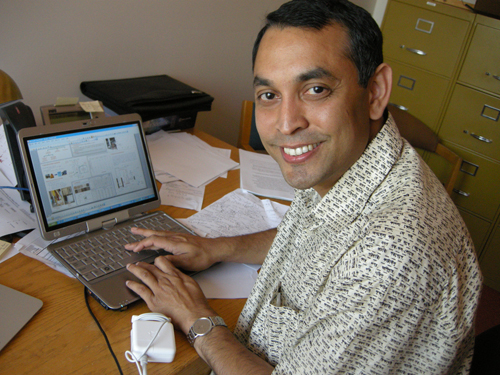
Engineering professor Animesh Dutta remembers his childhood in Bangladesh as “cyclones and tidal waves all the time.” It was certainly different from life in Canada, but it was also during those early years that Dutta first felt the pull towards discovery that led him to his current career.
“In 1983, when I was very young, I heard that Halley’s comet was coming. We didn’t have power at that time, so I went out in the dark with a lantern and figured out the angle by hand so I could know where to look for the comet,” he says. “It sparked a lifelong interest in science.”
Dutta took his first steps towards making science his career when he earned a B.Sc. in mechanical engineering at Bangladesh University of Engineering and Technology. He studied mostly atomic energy but became interested in renewable energy. He headed to Thailand’s Asian Institute of Technology (AIT) to complete a master’s in energy technology. “This is the top school in Asia, with a broad international reach in terms of both faculty and students,” he says. “There were students from 46 countries.”
For his doctorate in mechanical engineering, completed in 2002 at Dalhousie University, Dutta studied technology for burning cleaner coal. After graduation, he took on a project funded by the Canadian International Development Agency to help people in India convert conventional coal-fuelled boilers into environmentally friendly fuel-flexible boilers.
Through contacts forged at AIT, he is now working on several international projects, primarily developing energy from biomass and waste products.
“The vision I have is that food should take priority,” says Dutta. “We should not be using food crops to create energy. My goal is to use the waste products instead.”
He also stresses the need to diversify. “If you are an investor and you have all your investments in just one stock, you run a big risk if anything happens. That’s where we are — we are too dependent on oil, and that makes us vulnerable. We shouldn’t be dependent on any single source of energy.”
The benefits of turning waste into energy go beyond breaking our reliance on oil, he adds. “Farmers have very high energy costs, and if we can provide a system that reduces those costs by using their waste products, we can help them cut back on their expenses and, ultimately, perhaps reduce the price of food.”
But those potential benefits won’t be worthwhile if converting biomass to energy ends up harming the environment, says Dutta. He’s looking at ways to minimize that impact.
For example, he’s developing a system that treats biomass to produce hydrogen (a clean-burning energy source) and to capture and sequester carbon dioxide — a true carbon-neutral process.
He’s also studying torrefaction, or heating biomass to upgrade it for fuel use. Explains Dutta: “Coal plants are designed to use high-quality coal. We’d like to replace the coal with biomass, but the biomass has more moisture and produces less heat. The torrefaction process involves heating the biomass without any oxygen present. When it’s done, the treated fuel will no longer absorb moisture — reducing storage costs — and burns without smoke.”
Dutta says that, despite his worldwide connections, Canada is now home for his family, including his two daughters born here. His attraction to this country came early on.
His first home in Halifax was a boarding house whose other residents were mostly seniors, all on a limited income.
“I knew they didn’t have much money, but at Christmastime, when I’d been there about a month, little gifts appeared in front of my door. They knew I was a student and alone in the country, and they wanted to share something with me. I’ve never forgotten that. That says Canada to me.”